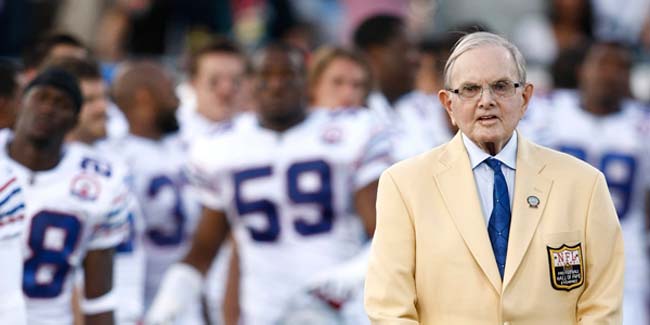On the Death of Ralph Wilson
A legend of the National Football League has passed away.
Ralph Wilson, founder and owner of the Buffalo Bills, died on Tuesday afternoon. He was 95 years old.
Wilson was one of the original founders of the American Football League, bringing professional football back to Buffalo for the first time since 1949 and the All-American Football Conference.
Wilson was more than just another owner, however. He was a driving
force behind the success of the AFL, and helped the league grow to the
point where it was a legitimate competitor to the NFL.
Wilson was
one of the few original AFL owners to be in a fine state financially,
and he was willing to help the other franchise owners stay afloat in the
early years of competition. The Oakland Raiders, for example,
floundered early on, thanks in part to their direct competition with the
San Francisco 49ers. Wilson loaned the team $400,000, keeping them in
business, despite it being against the AFL's bylaws.
A few years
later, Wilson helped negotiate the television contract that kept the AFL
afloat, and brought them into direct financial competition with the
NFL. NBC, having lost out on the rights to broadcast the older league,
went and offered the AFL $600,000 a team a season, as compared to the
NFL's $1 million. Wilson fought back and negotiated, and managed to up
the offer to $900,000, giving the fledgling league a platform to fight
for quality players with their older rivals.
Wilson negotiated
the first television package leaguewide, as opposed to the team-by-team
approach the NFL had taken. It kept each and every AFL franchise on
equal footing, and insured smaller markets like Buffalo and Oakland
could compete in the new, television-fueled landscape. Wilson also was
integral in arranging for the sharing of gate revenues for the new
clubs, keeping all teams afloat.
Under Wilson's ownership, the
Buffalo Bills thrived. They won back-to-back AFL championships in 1964
and 1965, fielding great players like Jack Kemp and Cookie Gilchrist.
Along with the Houston Oilers and Kansas City Chiefs, they were the
class of the AFL.

Wilson also served on the committee that
negotiated the eventual merger of the NFL and AFL. He helped ensure
that none of the existing teams would be forced to fold, keeping
football in Buffalo.
Indeed, "keeping football in Buffalo" is the
lynchpin of Wilson's legacy. He voted against every single franchise
relocation vote that ever came up, attempting to keep teams in their
historically accurate cities. He refused to sell or give up any control
over the Bills for the majority of his lifetime, such was his passion
for the team and determination to keep them in the smaller Buffalo
market.
"People become attached to the franchise,"
Wilson said. "They take their children to the game. So many people
across the country I have met have said, 'My father used to take me to
the games in old War Memorial Stadium in downtown Buffalo. We used to
stand in the end zone.' The people in a community become attached to a
team. It gives them a quality of life."
Wilson's death was met by tributes from his fellow owners and former players.
Commissioner Roger Goodell issued a statement praising Wilson's legacy.
"Ralph Wilson was a driving force in developing pro football into America's most popular sport," Goodell said in a statement. "He loved the game and took a chance on a start-up league in 1960 as a founding owner of the American Football League. He brought his beloved Bills to Western New York and his commitment to the team's role in the community set a standard for the NFL.
"As a trusted advisor to his fellow league owners and the commissioner, Ralph always brought a principled and common-sense approach to issues. His lifelong loyalty to the game was instrumental in his richly deserved induction into the Pro Football Hall of Fame. We are grateful for his many contributions to the NFL and offer our heartfelt sympathy to the Wilson family."
The future of the franchise in Buffalo now gets plunged into doubt. Wilson's efforts to keep the team in Buffalo despite an aging stadium and a small market single-handedly kept them in town. There has been interest to move the team to Toronto or Los Angeles, as well as several groups who have hoped to keep the team at least in western New York, if not Buffalo proper.
One way or another though, Wilson's legacy to the city of Buffalo is secure. While the Bills floundered in recent years, it was Wilson who build them up and created their legacy, from the early days in the AFL through the Jim Kelly and Bruce Smith years in the early ‘90s. Wilson's impact on football is rivaled only by that of George Halas and Bud Adams, the only three men to have owned a professional football team for fifty consecutive years.
He will be missed by the entire NFL family.
What do you think?
We'd love to hear your comments and/or opinions. If you submit them here, other visitors can read them, rate them and comment on them. An e-mail address is not required.






New! Facebook Comments
Leave a comment about this article in the box below and share it with your Facebook friends.